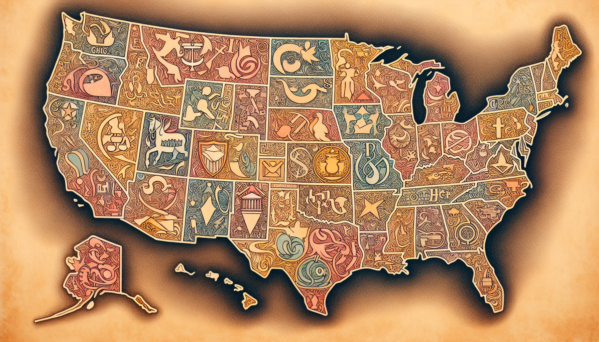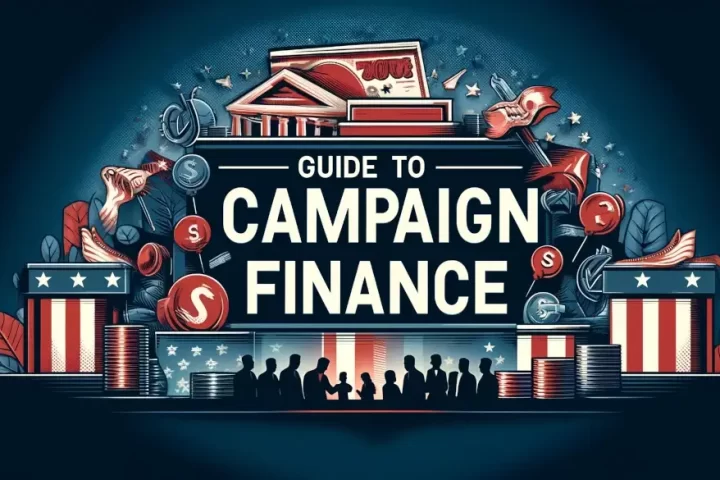Navigating campaign finance laws is critical to understanding the role of money in US elections. This guide cuts through the complexity, offering a straightforward explanation of contribution limits, enforcement mechanisms, and the influence of Supreme Court rulings. Whether you’re a voter, candidate, or contributor, our coverage of federal to state-level regulations will illuminate the rules that shape the electoral landscape.
Key Takeaways
Federal Election Campaign Act (FECA) sets donation limits for individuals and entities to prevent undue influence on elections, monitored by the Federal Election Commission (FEC).
Supreme Court decisions like Citizens United v. FEC have dramatically altered campaign finance laws by allowing unlimited corporate spending in elections, which has led to the rise of Super PACs.
State campaign finance laws create a complex regulatory landscape for candidates, with various states imposing their own rules alongside federal laws, affecting contributions and spending.
Table of Contents
- Navigating Federal Campaign Finance Laws
- The Influence of Supreme Court Decisions on Campaign Finance
- State Campaign Finance Regulations: A Patchwork of Laws
- Transparency in Political Contributions: Disclosure Requirements
- Political Parties and Campaign Finance
- Special Interests and Independent Spending in Elections
- Campaign Finance Data: Accessibility and Analysis
- Summary
- Campaign Finance: What You Need To Know Now
- Frequently Asked Questions
Navigating Federal Campaign Finance Laws

The regulations governing campaign finance function as a set of mandatory guidelines that all participants in federal elections must adhere to. At the core of these regulations is the Federal Election Campaign Act (FECA), which acts as the foundational federal campaign finance law.
This legislation also referred to as simply “campaign finance law,” dictates everything from who is eligible to contribute financially and their maximum contribution amounts, to how those funds may be utilized. It plays an oversight role similar to a guardian monitoring financial activities within federal elections.
Within the scope of the 2023-2024 election cycle, each individual has been capped at contributing no more than $3,300 per election to candidate committees. Individuals can give up to $5,000 annually toward PACs while national party committees have been set a limit of $41,300 each year.
These caps are strategically placed with the intent of averting any single contributor from exerting excessive influence on an electoral outcome – preventing scenarios where wealthy benefactors might bankroll entire campaigns unilaterally, which would otherwise upset fair competition principles inherent in democratic processes.
The Role of the Federal Election Commission
Curious about who maintains the integrity of campaign finance regulations? The Federal Election Commission (FEC) is tasked with that critical role. Acting as a watchdog, the FEC upholds federal election laws related to finances and keeps candidates and committees in check. They diligently review political campaigns’ financial disclosures and oversee how they manage donations.
In particular, they make certain that during federal elections, no more than $100 in cash can be donated by an individual contributor while also regulating anonymous contributions exceeding $50. So while the foundational guidelines for campaign finance are set forth within the Federal Election Campaign Act, it falls on the FEC’s shoulders to guarantee adherence to these rules throughout all election campaigns at the federal level.
Major Amendments and Acts
The initial framework for campaign finance, established by the Federal Election Campaign Act of 1971, mandated transparency regarding contributions and expenditures during campaigns. This preliminary legislation required enhancements to fully regulate the complexities of campaign finances.
In response to evolving needs, substantial reforms were introduced through the Bipartisan Campaign Reform Act of 2002. This amendment aimed at closing gaps in the existing law by banning national political parties from accepting soft money contributions for federal election activities. It underscored that laws governing finance in politics adapt over time to address new challenges and circumstances within federal elections.
Understanding Contribution Limits
The cornerstone of federal campaign finance laws is the establishment of contribution limits. These Limits control the extent to which individuals and organizations can financially support a political campaign. For the 2023-2024 election cycle, these restrictions have been set at various levels: $3,300 for contributions to candidates directly.
PACs are allowed up to $5,000 annually per entity contributed towards their cause while national party committees hold a higher threshold with permissible contributions up to $41,300.
These figures apply specifically within this designated time frame and serve as measures to prevent overwhelmingly wealthy donors from exerting excessive sway over electoral outcomes by maintaining an equitable environment in terms of financial influence.
There’s more complexity in these regulations beyond mere numerical caps on donations. Election-related communications that involve coordination between a candidate or campaign and another contributing body
Be it through non-monetary gifts or expenses undertaken mutually are subject either to classification as in-kind donations or as coordinated expenditures attributed to overall permitted donation totals under party committees’ accounts.
Therefore, grasping the intricacies behind what constitutes an actual monetary contribution becomes vital when navigating through adherence with established campaign finance laws.
The Influence of Supreme Court Decisions on Campaign Finance

In the evolving narrative of campaign finance, rulings from the Supreme Court have frequently altered the trajectory of relevant laws. By affirming certain elements while invalidating others, these decisions significantly remodel how campaign finances are regulated. Notably, in Citizens United v. Federal Election Commission, the Supreme Court invalidated key portions of the Bipartisan Campaign Reform Act. Act by permitting corporations to make unlimited election expenditures.
Such pivotal decisions generate vigorous discussion around ensuring equitable elections versus protecting free speech rights within federal elections. Consider a scenario where a corporation invests heavily in backing a candidate sympathetic to its agenda—questions about electoral fairness inevitably arise under such circumstances.
These Supreme Court judgments underscore an enduring challenge: achieving an equilibrium within campaign finance legislation that upholds both democratic integrity and freedom of expression principles.
Free Speech and Political Spending
The intricate nexus between free speech and the regulation of campaign finance has been evolving over time. Historic regulations such as the Taft-Hartley Act (1947) and Tillman Act (1907) established initial rules governing political spending, specifically prohibiting:
corporate financial contributions to federal candidates
union financial contributions to federal candidates
expenditures by corporations in support of federal candidates
expenditures by unions in support of federal candidates
In contemporary discourse, advocates for non-profit involvement in political financing contend that this type of expenditure constitutes a form of expression safeguarded by the right to free speech. They assert that excessive disclosure mandates could deter engagement in political activities. Thus continues the intricate dance seeking equilibrium between preserving freedom of expression and ensuring electoral integrity, with each legislative change or judicial ruling contributing additional nuance to an already complex issue.
The Aftermath of Citizens United
The decision in Citizens United radically altered the terrain of campaign finance by permitting corporations to channel unlimited resources into elections. This catalyzed the emergence of super PACs and prompted a substantial escalation in political expenditures from independent entities.
Subsequently, there was an estimated surge of about 125 percent in political investments from groups not directly managed by candidates or their campaigns between the electoral periods of 2008 and 2012.
Such exponential growth has raised alarms over possible corrupt activities and undue sway held by affluent benefactors and interest groups, creating a scenario reminiscent of campaign finance’s version of the Wild West—where those with ample financial firepower have the most influential voice.
State Campaign Finance Regulations: A Patchwork of Laws

Navigating the intricacies of campaign finance doesn’t stop at understanding federal laws. You also need to grasp the nuances of each state’s regulations. The landscape is richly varied, with each state adding its own distinct set of guidelines, forming what could be likened to a mosaic where each piece contributes uniquely.
Take for example various states that implement measures such as:
Imposing limits on political contributions during legislative sessions by lobbyists to mitigate their sway over lawmaking
Setting rules regarding financial support from foreign sources
Establishing protocols for accepting cryptocurrency within political fundraising
Consequently, any political candidate must become adept not only at complying with general finance laws but also with those specific and often intricate requirements set forth by their home state.
Public Financing Options
Certain state candidates have access to an alternative funding source for their campaigns beyond private donations, which is public financing. These initiatives can either match small individual contributions or provide complete campaign funding, thus presenting a different route of campaign support.
Yet, there are conditions tied to this option. Receiving public funds means agreeing to strict regulations on fundraising and campaign spending. It’s essentially a compromise: in exchange for the advantages of public funding, candidates must comply with more rigorous guidelines.
Transparency in Political Contributions: Disclosure Requirements

Campaign finance laws are built on the principle of transparency, which mandates that the sources and expenditures of election funds be open for public scrutiny. This kind of openness is akin to illuminating a previously darkened space, exposing all hidden aspects.
As an example, political committees at the federal level are required to file comprehensive reports detailing their financial activities — specifically documenting both incoming receipts and outgoing expenses.
These submissions must also list those individuals who donate more than $200 either per election cycle or annually. Once received by the FEC (Federal Election Commission), these documents become accessible to anyone within 48 hours. If curiosity strikes about who’s backing your local congressperson’s campaign efforts, this data can readily be found with just a brief internet search.
Tracking Political Donations
Maintaining accurate records of political contributions is essential for ensuring transparency and adherence to campaign finance regulations. Consider this as akin to a detective keeping meticulous notes in their casebook, where each contribution received and spent is carefully documented.
To ensure that donations are allocated correctly, the FEC mandates that campaigns keep a detailed accounting system distinguishing funds designated for separate elections. This stipulation guarantees that every donated dollar is utilized strictly for the intended election it was given, safeguarding financial compliance with legal requirements.
Political Parties and Campaign Finance
Political parties serve as the foundational pillars in elections, providing support to their nominees and actively working towards shaping the results of political campaigns. They aren’t merely onlookers. They are engaged participants within the campaign finance framework.
Federal laws that set forth contribution restrictions govern what political party committees can do with regards to raising funds. For instance, these rules restrict them from accepting more than $100 in cash donations from a single entity. Anonymous donations accepted by any political committee must not exceed $50 per source. Henceforth, while being key players during election times, these parties and committees are also bound by established regulatory constraints.
National Political Parties’ Financial Activities
Political parties at the national level wield considerable sway over electoral outcomes, yet they are subject to stringent financial regulations. Individuals may donate a maximum of $41,300 annually to these national political entities.
These parties can participate in coordinated communications with candidates that are treated as non-monetary donations or ‘in-kind contributions.’’ Nevertheless, such endeavors must adhere to prescribed limitations and regulatory guidelines. Thus, despite their potent influence on election processes, national political parties do not have unfettered freedom when it comes to expenditure.
Coordination Between Candidates and Parties
The intricate connection between political candidates and their respective parties plays a pivotal role in campaigning. Coordinating efforts is vital for triumph at the polls, yet it simultaneously influences contribution caps and can result in illegal contributions.
In instances where donors give to party committees with the knowledge that a substantial share of their donation will back a specific candidate, such donations might be considered against that donor’s prescribed contribution limit for the individual candidate. Hence, cooperation between political entities is key. This partnership must be meticulously managed to ensure adherence to regulatory guidelines.
Special Interests and Independent Spending in Elections

Beyond candidates and political parties, various actors such as special interest groups and Super PACs participate in the electoral process. They have the capability to independently exert influence on election outcomes through their spending, which is not restricted by contribution limits that apply to direct donations to candidates.
Yet it’s important to note that these independent expenditures can transform into in-kind contributions if subsequent coordination with a candidate’s campaign occurs. In this case, they might fall under the same contribution restrictions or could even be considered illegal contributions. Hence, despite having a considerable impact on elections through independent spending, there are still regulatory boundaries in place.
The Rise of Super PACs
One of the major outcomes of the Citizens United decision was the rise of Super PACs. These entities can raise and spend unlimited funds as long as they do not directly coordinate with candidates or campaigns. It’s like giving a bullhorn to special interest groups – their voices can be heard loud and clear.
Since their inception, Super PACs have spent close to $3 billion on federal elections, with their spending increasing in both presidential and midterm elections. The top donors to Super PACs often contribute more than $1 million, emphasizing the political influence of wealthy donors and special interest groups. However, this has raised concerns about potential corrupt practices and the balance of power in elections.
Campaign Finance Data: Accessibility and Analysis
The financial underpinnings of electoral processes are laid bare through campaign finance data. Once submitted to the FEC, this information becomes accessible to the public within two days but is restricted from commercial exploitation or use in soliciting contributions.
This data uncovers intricate details about election benefactors and their expenditure levels. The Campaign Finance Data division of the FEC offers insights into records submitted by entities including:
Presidential campaigns
Political Action Committees (PACs)
Political parties
Members of both chambers of Congress
For those seeking an in-depth exploration of campaign finance dynamics, this repository is replete with insightful facts and figures.
Utilizing Campaign Finance Data
Examining campaign finance data offers intriguing perspectives on the monetary transactions within election campaigns. The Federal Election Commission (FEC) provides tutorials that guide individuals through the process of acquiring and employing raw data files concerning campaign finance details.
Restrictions are in place to prohibit the application of this information for commercial endeavors or for soliciting contributions unless it involves using political committee details to request donations directly from those committees. Hence, while these datasets serve as a significant asset, there are safeguards implemented to guarantee their ethical and responsible utilization.
Summary
Navigating the intricacies of campaign finance is essential for political participants and informed voters alike. These regulations, encompassing contribution limits to disclosure requirements, craft the monetary framework within which elections operate. At all levels—federal to state—and affecting a range of entities from individual candidates to entire political parties, adherence to these financial rules is mandatory.
Campaign finance laws are continually adapting, seeking an equilibrium between protecting free speech rights and maintaining equitable electoral proceedings. The emergence of Super PACs along with escalated independent spending has introduced additional complexity into already intricate legal structures.
Amid these changes, remains a fundamental principle: transparency and accountability stand paramount in safeguarding just and democratic election outcomes. When exercising your voting privileges, bear in mind that it’s not solely about the individuals vying for office—it’s equally about their financiers’ influence.
Campaign Finance: What You Need To Know Now
Frequently Asked Questions
What are some of the restrictions on campaign finance set up by federal law?
Federal legislation imposes limitations on campaign finance, including a cap of $100 for cash contributions from one individual towards any federal election effort, and a maximum of $50 for donations that are made anonymously.
The intent behind these restrictions is to promote openness and responsibility within the process of elections.
What is a campaign finance violation?
When an individual violates the regulations established by the Federal Election Campaign Act, this constitutes a campaign finance infringement. Such violations include improperly making or accepting contributions and neglecting to disclose financial activities or expenditures associated with a federal election. Falsely claiming authority from a political campaign or unlawfully requesting contributions on certain federal premises also fall under these breaches.
What questions do campaign finance laws cover?
Campaign finance laws cover regulations on campaign contribution limits, public funding in presidential elections, and tracking campaign finance data, overseen by the Federal Election Commission (FEC).
What is the goal of campaign finance laws?
Campaign finance regulations aim to oversee public funding and impose restrictions on campaign contributions during presidential elections, thereby fostering transparency and curbing potential political corruption.
What are the contribution limits for federal elections?
During the 2023-2024 election cycle, individuals may contribute up to $3,300 per election to candidate committees for federal elections. Contributions to Political Action Committees (PACs) are capped at $5,000 annually, while donations can be made up to a maximum of $41,300 each year to national party committees.

Heya i am for the first time here. I found this board and I to find It really useful & it helped me out much. I am hoping to give something again and aid others like you aided me.